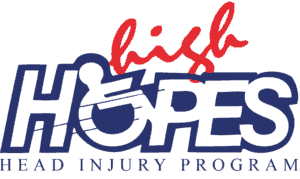Brain Tumor
A brain tumor is a mass or growth of abnormal cells in the brain. Some brain tumors are noncancerous (benign), and some brain tumors are cancerous (malignant).
High Hopes Can Help!
Rehabilitation: Because brain tumors can develop in parts of the brain that control motor skills, speech, vision and thinking, rehabilitation is a necessary part of recovery.
Watch our video and come see High Hopes.

Play Video
Treating
Here is what you should know about
Brain Tumors
What is a brain tumor
A tumor is a mass of tissue that’s formed by an accumulation of abnormal cells. Normally, the cells in your body age, die, and are replaced by new cells. With cancer and other tumors, something disrupts this cycle. Tumor cells grow, even though the body does not need them, and unlike normal old cells, they don’t die. As this process goes on, the tumor continues to grow as more and more cells are added to the mass.
A primary brain tumor is one that originates in the brain, and not all primary brain tumors are cancerous; benign tumors are not aggressive and normally do not spread to surrounding tissues, although they can be serious and even life threatening.
Diagnosing
A neurologist will ask questions about your symptoms, take a personal and family health history, physical exam, and a neurological exam. If there’s a reason to suspect a brain tumor, the doctor may request one or more of the following tests:
- Imaging studies such as a CT(CAT) scan or MRI to see detailed images of the brain
- Angiogram or MRA, which involve the use of dye and X-rays of blood vessels in the brain to look for signs of a tumor or abnormal blood vessels
The doctor may also ask for a biopsy to determine whether or not the tumor is cancer. A tissue sample is removed from the brain either during surgery to remove the tumor or with a needle inserted through a small hole drilled into the skull before treatment is started. The sample is then sent to a lab for testing.
Symptoms
The signs and symptoms of a brain tumor vary greatly and depend on the brain tumor’s size, location, and rate of growth.
- Seizures
- Changes in speech or hearing
- Changes in vision
- Balance problems
- Problems with walking
- Numbness or tingling in the arms or legs
- Problems with memory
- Personality changes
- Inability to concentrate
- Weakness in one part of the body
It’s important to keep in mind that these symptoms can be caused by a number of different conditions. Don’t assume you have a brain tumor just because you experience some of them. Check with your doctor
Treatment for a brain tumor depends on the type, size, and location of the tumor, as well as your overall health and your preferences.
Rehabilatation
Because there are so many different types of brain tumor there are also many types of rehab options.
Most options use speech therapy, physical therapy, and Occupational therapy.
** or just call High Hopes
Stay Positive
You need to learn to live your new normal. You may be dealing with ongoing physical and neurological symptoms, but you are alive and hungry to continue living your life.
It is not easy, we know. We want to help. High Hopes has been able to help many students with brain tumor maximize there life.

